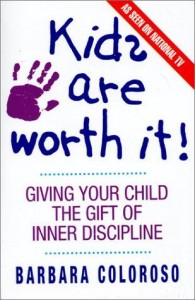Parenting food for thought
 This is a post that’s been in my drafts folder for about a year. It has to do with a book I haven’t finished called Kids Are Worth It! by Barbara Coloroso. It’s an interesting book, and I liked it. But my reading process was getting interrupted a lot and I shelved it for a future time. I need to either delete this or post it, so I’m going to post it.
This is a post that’s been in my drafts folder for about a year. It has to do with a book I haven’t finished called Kids Are Worth It! by Barbara Coloroso. It’s an interesting book, and I liked it. But my reading process was getting interrupted a lot and I shelved it for a future time. I need to either delete this or post it, so I’m going to post it.
*****************
Kids Are Worth It keeps touching nerves. I keep coming across passages I want to remember. Here are a few:
Who of us is mature enough for offspring before the offspring themselves arrive? The value of marriage is not that adults produce children but that children produce adults. (Peter DeVries)
Lots of food for thought there. At different points along the way, I’ve made a tiny sign for myself and stuck it high up on the fridge: “You’re the mother.” It reminds me not to be always asking things like, “How about getting dressed” instead of “Time to go get dressed,” or “Would you like some lunch?” instead of “Time to eat,” etc. I seem to have this default tendency to make everything negotiable — at least in the way I phrase things.
But that’s just a passing quote. Here are some from the author, Barbara Coloroso:
If the natural consequence is nonexistent or would not give life to your child’s learning, it may be time to help out with reasonable consequences. Many parents struggle to come up with consequences that are appropriate and meaningful. If you have to struggle to come up with a consequence, step back and ask yourself if you are trying to punish your child or discipline him. Natural consequences just happen; reasonable ones take a bit of reasoning but not a lot of energy on your part, and certainly shouldn’t be a struggle.
I do struggle to come up with consequences for misbehavior at times. I’m not sure it’s necessarily that I’m out just for control; often I’m just not very creative at enforcing a consequence that will simulate the natural one they’ll meet outside these walls. But this puts the problem clearly.
I like this too, about how often we say “no” just as an automatic response to our kids. I’ve noticed that before. Coloroso offers three alternatives:
Save your no for the big issues, when you really mean No! The rest of the time, as the no begins to form on your lips, stop a moment and see if one of the alternatives might better suit both you and your kids:
- “Yes, later.”
- “Give me a minute.”
- Convince me.”
I’ve used the first and third already today and like the tone they set. I really like the idea of resetting so that “yes,” rather than “no,” is the default answer.
Last but not least (for now — and I’m only 80 pages into this 243-page book), here are four kinds of questions Coloroso lists that “get us nowhere fast.” None of us would ask them, probably, if we thought about it. But they can sputter out all too often because we don’t think.
The first: Questions with no right answers — for instance, “Why would you use the scissors to make stripes on your desk?” Beside the point, really. There is no “why” that will be acceptable. Better to say, “Let’s talk about why this wasn’t a good decision.”
The second: Questions with no options. The ones I listed above fall into this category: “How about picking up your toys now?” What if they say no? Better not to phrase it as a question at all.
Third: Questions that punish. I usually catch myself and bite my tongue before launching in to one of these — “Can’t you EVER clear the table right?” type of questions.
Last: Questions that are wishy-washy. “Do you mind if I say something?” or “It would be good to finish math before lunch. That’s a good idea, don’t you think?” Be assertive as the parent, Coloroso advises.
I like how practical the advice is, and how it gets down to the nuts and bolts. But I also like the underlying idea of respecting our kids:
Children are extraordinarily precious members of a society; they are exquisitely alert, sensitive, and conscious of their surroundings; and they are extraordinarily vulnerable to maltreatment or emotional abuse by adults who refuse to give them the profound respect and affection to which they are unconditionally entitled. (Wisdom of the Elders)
Full of superlatives… but true. It reminds me of Jesus’ words about children in Matthew 18 and 19.





6 Comments
Carrie, Reading to Know
Hmm. Definitely food for thought here.
I’m thinking mostly about the three alternatives to answering “no” (which I do quite a bit.) I have to keep reminding myself that the world was thoroughly exciting when I was little and EVERYthing was a distinct possibility. I don’t want to always be saying “no” to my children’s requests – whether they be asking me to do something or asking to create something that I think is a bit messy or impractical.
I definitely agree that no one is mature enough for children but learn how to deal with them as the children grow. =D I’ve heard the argument made more frequently than I’d like to hear it that someone isn’t “ready” yet for children. I keep thinking to myself that they’ll have to be in their grave, pretty much, before they could come close to being ready. WHO among us is really ready? Maybe some of us are overconfident. ;D Or hopeful. Or realistic.
GretchenJoanna
Thanks for sharing some great quotes and principles. I also had to figure out a lot of this along the way! Even if we are sort of ready for children in the broad sense, each child is a new challenge. It seemed to me that much of what I learned raising one child was not applicable to the next, since every one was unique…and in our case, the last of five was the most different and required her parents to keep on developing new outworkings of basic parenting truths.
Barbara H.
Sounds good! I did have to learn a long time ago not to ask questions with a yes or no answer if no was not acceptable. One of mine used to fuss that even though I “asked nicely” (“Would you unload the dishwasher please?”), it wasn’t really a request because they still had to do it. I said, “Would you rather I barked orders at you?” We had that exchange a few times.
I agree that we’re not really mature enough for offspring until we have them. And I like the alternatives to”No.”
Janet
I like how practical the book is.
I say things like “No,” “Not now,” “Be careful,” or (when it comes to messy or space-consuming projects) “Where are you going to put it?” far more than I say “Great idea! Go for it!” There needs to be a balance. That’s what I’m working on this week!
Amy @ Hope Is the Word
Ah, my Achilles heel in parenting–messy projects! Oh, and a certain adorable boy toddler who is smashing all my preconceived notions and expectations about child training left and right. Does she have any suggestions for 16 month olds who still don’t sleep through the night?
Sorry for the sarcasm. I love parenting books and this one sounds like a good one.
Janet
Oh Amy — I’d be much more sarcastic if I’d been sleep deprived for 16 months!
I haven’t read many parenting books. Just ‘Shepherding Your Child’s Heart’ (which I didn’t like), and ‘Boundaries with Kids’ (which I DID like). This was the third, and I really liked what I read of it; a friend of mine recommended it as her favorite parenting book. I do need to finish it.
We’re in a Sunday school class right now on parenting, working through a fourth title: ‘If Jesus Were a Parent.’